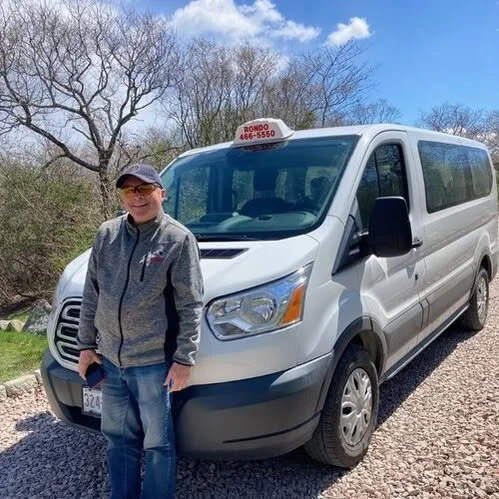10-10 Decisions
The Sphere, Las Vegas
“This year I’m taking Shonda Rhimes’ advice and saying 'yes' to everything,” Maria explains at our annual “planning” lunch.
She’s referring to acclaimed television producer and screenwriter Shonda Rhimes, who wrote a book, “The Year of Yes,” about her transformative experience of saying “yes” to everything for a year.
For Shondra and Maria, saying “yes” to everything is a way to overcome discomfort and fears. To challenge assumptions that new experiences might be unpleasant or boring.
My problem, and the reason I will not say yes to everything, is that I get into trouble when I say yes. In fact, my default is to say yes to everything impulsively.
Like when I signed an expensive lease and didn’t consider that it was a two-year lease, not a one-year lease, that it had no outdoor space for my outdoorsy self, and that it was above an Irish bar with a 2 a.m. last call and regular street brawls under my bedroom window at 2:30 a.m. But those floor-to-ceiling windows!
Like when my first major love/lust crush reached out after decades and suggested we meet for a weekend.
“Yes, where to?” I replied immediately. A little virile romp after caring for my husband and watching his body and mind disintegrate over 12 years? Yes, siree.
At 20, the former boyfriend was handsome, adventurous, and intriguing. In his 60s, he was a rather boring narcissist.
I say “Yes” too fast. Should I have a year of saying “No?”
Last summer, I relied on taxis when I visited Block Island, the 9.7-mile island between Rhode Island and Long Island. There are no Ubers or Lyfts, chain restaurants, or swanky hotels. It’s a laid-back beachy place.
“I need a ride from the Sea Breeze to the town beach,” I called into the taxi service.
“OK, we’ll be there in 10 minutes,” said the dispatcher.
“I need a ride from Dead-Eye Dick’s to the Sea Breeze.”
“OK, 10 minutes.”
“I need a ride from the Sea Breeze to the ferry.
“OK, 10 minutes.”
The taxi driver, who was also the central dispatcher for all the summer taxi drivers, monitored incoming requests on his radio while driving customers around the island. He replied, “10 minutes,” to every request, no matter where people were going.
One day, a convoluted request came over the radio while I was in his van.
“We need a ride,” said a young woman over the radio.
“Your location,” he asked.
I could hear the woman ask her friends, “Where are we?”
They were used to Uber or Lyft identifying locations from their phones. A beat-up van with an old-timey CB radio could not tell them where they were.
“I’m sorry, I need a location if you want a ride,” said the driver/dispatcher.
More mumbling and static. “Maybe we’re on Old Town Road?”
“Where on Old Town Road? Are you near The Old Town Inn?” the driver/dispatcher asked.
“Hey, are we near The Old Town Inn?” the woman asked her girlfriends. “Yes,” she said to the driver, “We’re at the Old Town Inn.”
He shakes his head, exasperated, and replies, “10 minutes.”
I’m not going to say “yes” to everything this year. Instead, I plan to riff on the dispatcher’s “10-minutes” and a version of Suzy Welch’s 10-10-10 Rule.
Welch, a business school professor and former editor of The Harvard Business Review, suggests we ask three questions before making a decision.
1. How will I feel about this decision in 10 minutes?
2. How will this decision affect me 10 months from now?
3. How will this decision impact my life 10 years from now?
These questions, she says, help us step out of the moment, reduce impulsive decisions, and evaluate what really matters to us. Alrighty then.
I plan to use 10-10, evaluating the 10-minute and 10-month consequences of an invitation. (At 70, looking 10 years out is either ridiculous, depressing, or both. I’m living in the now, or at least the next 10 minutes and 10 months.)
“Want to go to The Sphere next year?”
10-10. “In ten minutes, will I still feel excited about this concert, or will the money be just too much and stress me out? In 10 months, will I regret not going to this once-in-a-lifetime experience?” I buy the tickets.
“How do you want to repair the front door? An insulated fiberglass door, which is more expensive, or a simple wooden door?”
10-10. “In 10 minutes, will I still resent spending money on a door. I mean, I just spent hundreds on tickets to The Sphere. And in 10 months? It will be summer again with no worries about cold drafts. I go with the less expensive wood option.
“Are you interested in my friend's new matchmaking service?”
10-10 “In 10 minutes, will I get over the heavy “ugh” feeling about meeting up with strangers to quite possibly have strained, awkward conversations where the guy talks all about himself and I end up doing the work of asking questions and listening attentively? Will something feel missing in my life 10 months from now if I’m not in a relationship? Hell no. I’ll be at The Sphere with my friends.
In CB Radio codes, 10-10 means the person has finished talking and is standing by for a response. In my new decision code, 10-10 means my impulsive self has sent the message and is standing by for the analytical brain to evaluate the data.
Will this be as fun and transformative as saying, “yes?”
Probably not. Will it save me from impulsive messes? Let us hope.
Over and out.

